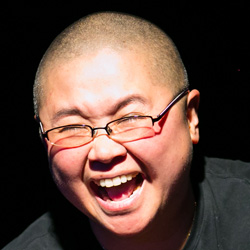Thao P. Nguyen
① Laura Hedli: What do you think about 10 seconds before going onstage?
Thao P. Nguyen: Just have fun.
② LH: Writing vs. performing – for you, which comes first?
TPN: Writing and performing go hand in hand for me. I rarely ever “write” – like, at a computer or in a notebook. And when I do try to “write” like that, I always end up making something boring. So, I often write on my feet. I get up. I talk to myself. I try to make myself laugh. Talk myself through a story in the shower. I call up my good friend and collaborator Martha Rynberg and ask, “Is this interesting? … No? Bummer.” Then I go back and work it until it is. I sign up for workshops so that I can work through a story on stage in front of a small group of people whom I trust. Generally, I try to tell the most amount of “story” in the least amount of words and in the least amount of time. And that requires that I get up, move, and use my body as the primary “storyteller.”
③ LH: From watching excerpts of your latest solo show WHITE POWER: A Comedy, I’ve taken note of the ways you employ silence and repetition for dramatic/comedic effect. This is really powerful. How do you trust that the audience will stay with you? (And we most definitely do.)
TPN: Silence is fascinating. We live in such a talky-talk, constant-barrage-of-messages, always-tweet-what-I’m-doing, debate-oriented, gotta-sell-you-something world. Quiet is unusual. Which makes it interesting.
Repetition is great. Repetition is great. (Ha! Well, not always. Not there at least.) But I do love it when an artist crafts something so that each time a word is repeated, it has new meaning. When a word or phrase comes back again, it brings with it all of its history. Language is amazing in that way; it’s layered and both full of memories and full of possibilities.
④ LH: I’ve been creeping on your website. (So thorough, up-to-date and lovely, by the way.) You’re currently working toward a performance studies PhD at Stanford after getting a MPH, MA and BS. Super impressive! Based on your performances I’ve seen, I know you aim to create work that challenges existing power structures and cultural appropriation. On your site, you say you are particularly interested in “increasing the visibility and understanding of issues most pertinent to populations experiencing multiple vectors of structural oppression.” As an art form, how do you believe solo performance can uniquely drive change?
TPN: We need more stories out there. Stories that are different than the ones we’ve been told and keep getting told. I’m exhausted by how boring, formulaic, predictable mainstream art is. Artists are told that there isn’t a big enough “market” for their work, or that their message won’t have “universal” appeal, or that “audiences” won’t be able to relate to something so specific. I think that’s just flat out wrong. It’s all in the specificity. That’s where the magic happens. Tell me about the teeny-tiny yet overwhelmingly important details of your life. Make it real for me. And I promise you, I’ll not only learn about who you are, but also about who I am too. Our differences – not our same-ness – bring us together. So, I want more stories. I want to know all the amazing ways it’s possible to be human.
